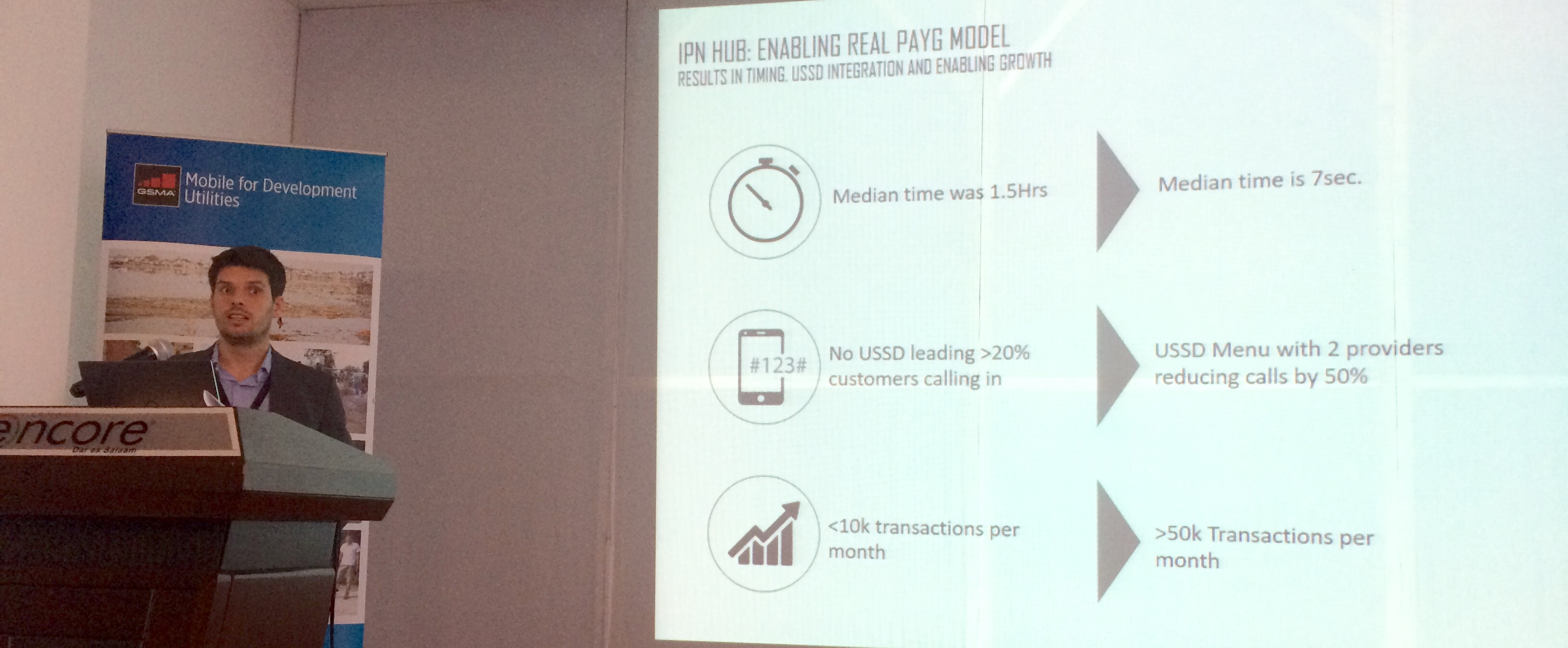The Mobile for Development (M4D) Utilities team recently attended and participated in two exciting events: a two-day working group in Tanzania and the GSMA’s Mobile 360 – Africa event. Mobile 360 – Africa provided a great platform to share our work on energy to a broad audience. The Working Group brought together 59 delegates from 42 organisations for two intensive days that included presentations on IoT, mobile payments and partnerships with mobile network operators, field visits, lots of discussion and networking! Here are our key reflections from the events:
1. There are innovative solutions for mobile payments
During the mobile payments session, we heard the results from BBoxx’s connection to the Instant Payment Notification (IPN) Hub. Like other pay-as-you-go (PAYG) solar providers, getting instant mobile money notifications is critical to their business model. Since BBoxx’s connection to the IPN hub, the time taken to receive notifications has reduced from hours to seconds, customer centre calls have reduced and the number of transactions has increased. The results shared by BBox and the call for expansion into new markets was positively received by the utility players in the room, who showed much interest in the GSMA initiative.
A year ago, the IPN Hub was presented as a potential solution for utility payments. The IPN Hub was initially piloted in Rwanda. It has been live for seven months, connects four entities (MTN Rwanda, Tigo Rwanda, BBoxx and Off Grid Electric), and has processed notifications for more than 200,000 payment transactions so far. Since it went live, there have been no instances of downtime experienced by the hub. One year on, the challenge is now to see if the IPN Hub can scale and achieve sustainability.
We also held a dedicated, hands-on session to review the Mobile Money Service Provider Toolkit that we recently published. Service providers with experience of mobile money integration and those still evaluating whether they should integrate, convened in small groups to review the toolkit. There was strong consensus that the toolkit provided the key considerations that a service provider must address during their decision making process.
2. Hearing about a project is good, seeing it in action is even better
Even with savvy PowerPoint presentations and live portals nothing beats seeing a live demonstration. Whether a demo or an outing in the field, seeing projects in action has a way of bringing participants to a full understanding and appreciation for innovation at work.
Site visits are a key component of the M4D Utilities Working Group, this year we managed to have two visits to Kopagas and Grundfos/Water Mission. At the Kopagas visit delegates were welcomed by extremely happy Kopagas customers (predominantly women), there was music, dancing and there was some cooking. The reason for the jubilation was because these customers no longer have to cook with charcoal and instead they can use LPG gas made available and more affordable to them thanks to Kopagas’ distribution network and mobile money payment collection.
The Grundfos/Water Mission visit was equally impactful, delegates witnessed one of the Water ATMs which serves the community and is operated by trusted members from the community. Users have an NFC enabled card which they are able to top up via an agent using mobile money and this card allows them to collect water and pay for what they need. The implementation is so simple and easy that anyone can use it. In addition to using mobile money, the Grundfos/Water Mission team are able to execute remote diagnostics using SMS. Both visits were great examples of how mobile is being used to provide access to essential utility services. Special thanks to Kopagas, Grundfos and Water Mission for being fantastic hosts.
3. Mobile-enabled energy access took the main stage at Mobile 360 – Africa.
In Africa, a significant gap is emerging between access to mobile and energy. In fact, over 600 million people lack energy access in Sub-Saharan Africa, representing roughly two in three individuals, yet 370 million of these individuals are already covered by mobile networks and that number is expected to grow.
At Mobile 360 – Africa, it was great to showcase how mobile operators and service providers have already made important steps forward in leveraging the ubiquity of mobile to delivery energy to underserved consumers. As H.E. Samia Suluhu Hassan, Vice President of Tanzania highlighted, the PAYG solar model has made impressive progress in providing clean and affordable energy to almost five million individuals. It was also great to hear from Strive Masiyiwa, CEO of Econet, and our first Mobile Operator Champion, Maarten Boute, Chairman of Digicel Haiti on how mobile operators are leading the way to reach SDG 7: to ensure universal access to affordable, reliable and modern energy services.
The M4D Utilities programme has been working to catalyse the mobile-enabled energy sector since 2013. We have recently launched our ‘Mobile for Energy Access’ campaign, calling for increased cooperation between the mobile industry and the energy sector to reach SDG 7.
For a case study on the PAYG model, supported by the M4D Utilities Innovation Fund, see our video with MTN Uganda and Fenix International:



